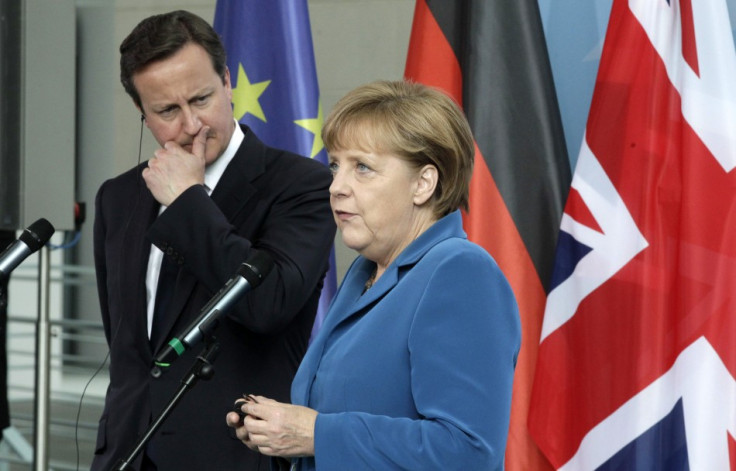Germany Does Politics, Too: Merkel's EU Budget Warning Sees Cameron as Useful Foil

It's not often you get to threaten the person you agree with most and still be see a brave political statesmen sacrificing for the greater national good.
But then again, the European sovereign debt crisis, lingering as though it may, doesn't happen very often either.
Strange bedfellows as UK Prime Minister David Cameron and German Chancellor Angela Merkel may be, they're probably the only remaining two voices in Europe (at least with a political mandate) willingly advancing the case for fiscal austerity.
Cameron has endured nearly a year of endless media ridicule for what has been characterised as an obstinate and dogmatic adherence to fiscal consolidation in the face of the steepest double-dip recession in at least a generation.
Merkel, meanwhile, has be no less vilified for seeming to force deep public spending cuts and structural reforms onto already haemorrhaging economies and bullying her European partners into codifying a form of permanent austerity into constitutional law by way of the Fiscal Pact.
Everyone else (France, the IMF, the World Bank, your local butcher) is either begging for growth policies or cutting spending at the barrel-end of the European Central Bank's "Big Bazooka".
So if you're heading into the most important European Union budget in history, where spending will be mapped out for the next seven years against a backdrop of the worst economic conditions in a generation and simmering political and social tensions that haven't been seen in at least four decades, you might want to gather as much support as possible before you stare down your rivals at the negotiating table.
Wait forever for a bus
What you probably wouldn't do, however, is throw your chief economic-ally under the bus.
Merkel showed little hesitancy for such a heave over the weekend, threatening to cancel December's EU Budget summit if Cameron, as he himself threatened, plans to veto it unless it's "good for Britain".
As well she might, after all, British politicians aren't the only ones capable of Machiavellian strategies.
There's no question Cameron stands to gain some political capital from the move as he galvanises his Conservative base with yet another "brave stance" against perceived Continental profligacy. Nor is there any doubt that the shambolic management of his chief whip's resignation - and the public criticism from within his own party that it generated - helped push the Prime Minister towards his pre-emptive stridency.
But all of that misses a larger truth: Merkel is playing Cameron for a fool.
And there's very little he can do about it.
"Schwieriges Jahr"
If you think Cameron's had a bad year, imagine being the German Chancellor?
Your once-steadfast sidekick on European austerity was turfed by the French and replaced by a socialist whose first order of business was to tell anyone listening that your policies had failed.
Your most important judge tells you that your deal to rescue Europe has a spending limit that can't be breached and that you've trampled German law as you pushed it through the Bundestag.
Your nation's former finance minister and uber deficit hawk has reinvigorated your heretofore dormant political rival and lifted them to their highest polling rate in six years.
You travel to Athens for the first time in a decade in order to show solidarity to the people for whom you've pledged multiple billions of euros in support, only to be greeted by violent, Nazi-themed protests.
You travel to Brussels the following week with the expressed intent of "going slow" on European banking reform only to appear sombrely at a press conference the next day announcing that a new banking regulator will be up-and-running just a few days after Christmas.
Oh, and your party face re-election next September after having been pounded mercilessly in local and state ballots throughout most of the year.
Thankfully, despite the public transport mythology, the expected British bus is running on perfect time and Cameron's veto threat is a gift from the political gods.
The German press has worked very hard to stay loyal to Merkel as she's pledged ever more billions to save its ungrateful and improvident European partners and hasn't, for the most part, turned against her.
How they might maintain that stance in December, after what could be three more bailout requests and a "compromise" agreement that would "only" increase EU spending by €1 trillion is anyone's guess.
Merkel knows this - and in the zero-sum world of political poker, she looks to have cannily trumped Cameron's bluff with an unbeatable hand.
No way out
If she nixes the Budget summit because of a perceived veto threat, she avoids the second-successive humiliation at the hands of Francois Hollande and returns to Berlin having triumphantly stuck two fingers up to the British Prime Minister.
If she goes ahead with the meeting despite the veto threat, she can easily harness the collective anger of the other EU members - always eager to isolate the meddlesome Cameron - to hammer out a deal that suits Germany's fiscal sentiment.
And if she has to relinquish a few hundred billion here or there from the German taxpayer, she can simply argue that Britain's hostility to the European project left here with no choice.
Cameron, on the other hand, will be left with no victory at all: budget deals are little-understood in the domestic media and its cancellation with either be seen as a technocratic failure at best or an example of Cameron's intransigence shutting down Brussels and forcing further financial stress onto Europe's most vulnerable at worst.
And if he doesn't use the veto, he risks returning to London having signed-off on spending increases in Europe just more than a million British households receive letters telling them their child benefit payments have been axed.
Cameron should be careful to look both ways before crossing the street to meet the German Chancellor next month in London.
Those busses are terribly big.
© Copyright IBTimes 2025. All rights reserved.





















